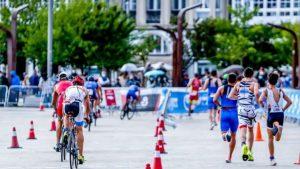
picture of a triathlon
Our friends Crown Sport Nutrition This month they bring us another very interesting article for endurance athletes.
It's about how you can delay fatigue in runners through carbohydrate intake during exercise, something sought after and desired by all coaches and athletes.
When an endurance athlete puts himself in the hands of a coach and a nutritionist, a series of objectives are established where the aim is to delay the onset of fatigue as much as possible.
It is known to all that having low carbohydrate intake can negatively affect sports performance in training or competition, so it is important to have some guidelines to incorporate these carbohydrates during exercise.
In this article, Crown is going to tell us about the importance of the Timing of intakes during exercise in endurance athletes.
For this they are based on current research, for example in a study carried out by Menzies and collaborators (2020) where the effect that the frequent or single intake of carbohydrates during physical exercise.
This study was carried out with a crossover design, a type of clinical trial in which all participants receive the same treatments (two or more), but the order of administration depends on the group to which they belong according to random assignment.
A total of 6 highly trained runners were randomly subjected to 2 conditions.
The first condition was the single carbohydrate intake in which they ingested 75g of sucrose after 75 minutes of running.
The second condition was to take 15 intakes of 5g of sucrose every 5 minutes of running.
In both conditions, the athletes performed a prolonged race reaching exhaustion.
In the study, it was possible to observe how the frequent and continuous intake of carbohydrates had several benefits in terms of performance.
The time to exhaustion was increased, the subjective perception of effort decreased and there was less use of muscle glycogen in the race they performed.
In addition, no differences were observed in the oxidation of energy substrates during physical exercise (carbohydrates and fats), or in circulating levels of glucose, lactate or free fatty acids.
The conclusion reached by the researchers was that frequent carbohydrate intake maintains glycogen stores and delays fatigue in runners, especially endurance runners.
As for what can be put into practice in resistance training or competitions, such as an IRONMAN, the carbohydrate intake will be directed to trying to take them continuously, in the amounts stipulated by the nutritionist / coach throughout the race.
It should also be borne in mind that avoid taking all carbohydrates in a single dose.
If this strategy is carried out in endurance races, it will be possible to increase performance in this type of discipline.
Reference:
Menzies, C., Wood, M., Thomas, J., Hengist, A., Walhin, JP, Jones, R., Tsintzas, K., Gonzalez, JT, & Betts, JA (2020). Frequent carbohydrate ingestion reduces muscle glycogen depletion and postpones fatigue relative to a single bolus. International journal of sport nutrition and exercise metabolism, 30(3), 203-209.